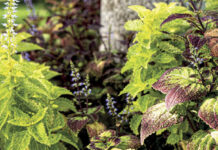It’s an irony of modern life that while we use an arsenal of cleaning products to keep our homes and work places sparkling clean and germ-free, these products may be damaging our health and the environment.
Take a peek under the average kitchen sink and you’ll be met with an array of labels with warnings such as “danger”, “poison”, “flammable” and “corrosive”. It’s hardly surprising that these substances are not especially safe for us or for Mother Nature.
However, it’s not only the immediate and acute effects that some chemicals can have on our skin and respiratory systems that are the worry. There are a whole lot more chemicals that have subtle, longer term effects on our health. Phosphorous, ammonia and nitrogen, for example, are all Volatile Organic Compounds (VOCs) which contribute to air pollution and are known carcinogens.
Sudsing agents DEA and TEA, can react with other substances to form nitrosamines – carcinogens that penetrate the skin. Other chemicals are believed to be hormone disruptors, blocking or mimicking the actions of hormones. Surfactants, butyl, silicates, chelating agents, phthalates – the list of harmful chemicals is extensive.
Homes and offices are built to be increasingly “tight” says Chris Weaver, sales and service manager at Island Supply, which sells cleaning and chemical products in Cayman.
On one hand, this helps to make buildings more energy efficient (and hurricane resistant) by creating a seal against the outdoors, but on the other hand, it means harmful chemicals and vapours are locked in and constantly re-circulated through air conditioning systems.
It is not only the effect these chemicals have on human health, but also the impact on the wider environment that is cause for concern. Once these chemicals disappear down the drain, they do not become inert. In Cayman, some homes have their own septic tanks which are periodically pumped out, while others are connected to a central sewerage system.
Either way, the waste water eventually reaches the water authority’s central wastewater treatment facility. There, water is treated to remove or reduce organic matter, solids and disease-causing organisms and nutrients to safe levels.
The treated waste water is then disposed of into wells that discharge at a depth of 40-110 feet below groundwater level, a depth well below that of Cayman’s fresh water lenses. However, the water authority states that “waste water contains phosphorous and nitrogen which are difficult to remove by conventional treatment processes. The water authority has no effluent limits for nutrients”.
Phosphates and nitrates (chemical compounds of phosphorous and nitrogen) are ingredients commonly used in fertilisers because of their ability to speed the growth of plants. Although valuable to farmers, once they have done their job on the crops, the chemicals find their way into the ground water and eventually into streams, lakes and oceans, where they fertilise algae, causing algal blooms that eventually clog up waterways, blocking out sunlight and adversely affecting the health of fish and other aquatic organisms.
One might think that there is less cause to worry about phosphates and nitrates here, where farming is only small scale. Consider, though, that an estimated 15 per cent of phosphates in the environment come from laundry detergents alone. Because of this, laundry detergents containing phosphates have been banned in some parts of the world. This is not the case in Cayman.
“Nobody cared what went into cleaning products for a long while,” says Chris, “The focus was on what the products could do rather than whether they were safe.”
A passionate environmentalist, Chris pioneered the Green Solutions Campaign at Island Supply and for more than eight years has been leading the way in Cayman, introducing eco-friendly cleaning products and biodegradable disposables.
Kirk Supermarket has also been stocking cleaning alternatives for several years.
“Environmental responsibility is part of our vision and core values,’ says Alan Harmon, category/merchandising manager at the store.
“Being eco-friendly and providing products to protect our natural resources not only helps our community, but provides sustainability for the future.
“As environmental concerns have become more common, demand for these products has grown tremendously, as has our selection. We now offer a large assortment of recycled products in addition to natural cleaning products that do not introduce harmful chemicals into indoor or outdoor environments.
“Our product selection has grown over the years to include personal care products as well, including toothpaste, deodorants, bath soap, and many others.”
Choosing the safest cleaning products for your health and for the environment is not easy when there is no requirement to list ingredients on their labels. However, you can be sure that if the labels don’t claim to be ecologically safe, biodegradable or phosphate free, it’s because they are not.
If you want to clean more greenly, choose carefully. Don’t be fooled by labels such as “natural” or “environmentally friendly”, which are vague and unverified. Instead, look for more specific labels such as “phosphate free”, “biodegrades in three to five days”, “fragrance free” and “chlorine bleach free”.
“As many avid cleaners know, it is the harsh chemical agents in cleaning products that allow them to work so well”, says Sharon Smith of Reliable Industries.
“Remove those chemicals and you may find that you need to use more of the product, or scrub that much harder to see the same results. However, I have personally tried a range of green/ecologically friendly products, and sell or use only those I have found to be effective.”
If you want to be sure your purchases are both safe and effective, look out for the Green Seal logo or the US EPA Design for the Environment logo. Green Seal, Inc. is an independent, non-profit organisation that certifies products that are truly environmentally responsible, sustainable and safe for humans, and which perform as well as – if not better than – non-eco equivalents.
Design for the Environment (DfE) is a programme of the US Environmental Protection Agency that promotes the use of products that perform as well as conventional cleaners, but have an improved profile for human and environmental health. In other words, they don’t yet qualify for the Green Seal but are certainly greener than products that don’t bear this logo.
“Going green can seem like a major lifestyle change,” says Sharon, “And the commitment required can put some people off even trying. Therefore I believe moderation is the key. You don’t have to change every aspect of your life to be greener all at once.
Find a manageable area you can change and start there – it might be using a microfibre cloth instead of paper towels, microfibre mops instead of regular cotton mops or finding a green floor cleaner. Every little helps.”































